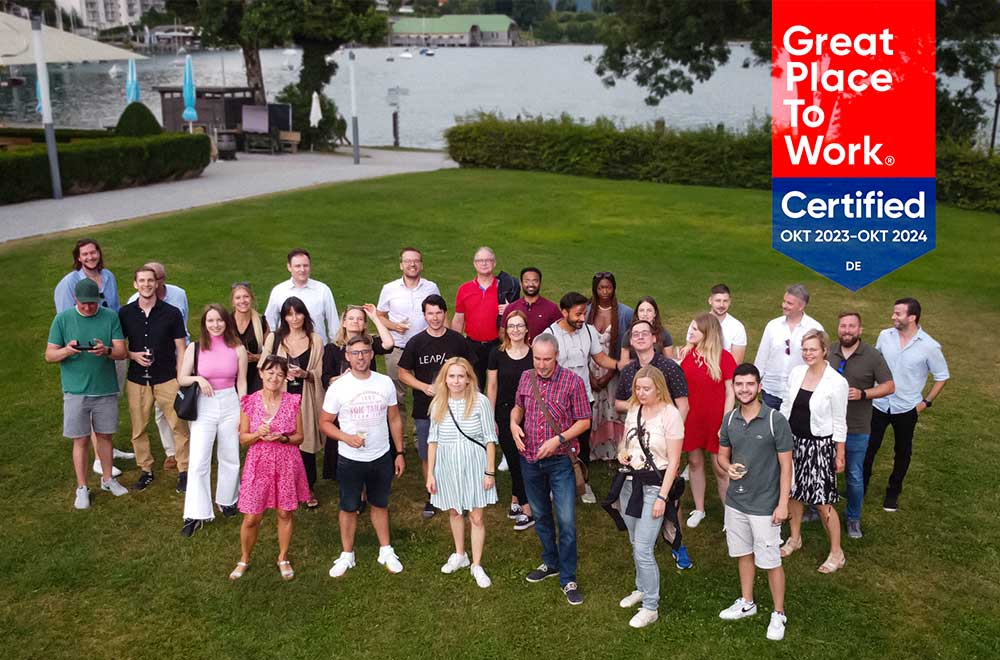How to find your cloud computing provider
An interview with our cloud expert Eduard Ralph.
Cloud computing is catching on
Cloud computing has been a hot topic since 2010, and since Covid 19 at the latest, most companies worldwide have been relying on cloud computing providers, mostly hyperscalers. Cloud is more than just storing data on other people’s computers or reducing costs by taking advantage of scaling effects. Cloud computing allows the “bite-sized portioning and payment” of computer services, reduces the entry barrier for companies to operate a professional IT infrastructure and transfers many administrative and non-value-adding tasks to the service provider. But which provider is the right one? What do I need to consider when introducing cloud computing in the corporate environment? And how does the migration of company processes to the cloud work?
Cloud computing providers: Which ones are out there?
A distinction is made between the “hyperscalers” – Amazon (AWS), Microsoft (Azure) and Google (GCP) – as well as niche and regional providers such as Alibaba Cloud in China or IBM and SAP’s Business Technology Platform. While there were various predecessor approaches in the early 2000s, the era of cloud computing began with the provision of Amazon’s Simple Storage Services (S3) under the inconspicuous name Amazon Web Services in 2006. To this day, Amazon Web Services remains the market leader among cloud providers, on which Netflix and Dropbox, for example, manage their data. Microsoft officially began in 2010 with the Windows Azure Platform, which was later renamed Microsoft Azure and is now the number 2 and is particularly popular with companies. Google, the last of the three hyperscalers, reached “general availability” in November 2011 and today manages petabytes of data from companies such as TikTok, Spotify and Apple. Over the past 20 years, a whole host of services have emerged around the cloud approach that offer much more than just data storage. As a company, you are now faced with the question:
Which provider is the right one for me if I go to the cloud now? What requirements do I need to meet? What do I need to look out for?
We asked Eduard Ralph – Head of Consulting at birkle IT to clarify these topics:
Quo Vadis : What is the current status of cloud computing in companies?
For a long time, German companies in particular were very reluctant to consider cloud computing. Legal and organizational uncertainty as well as an exclusive focus on quick cost savings were at the forefront of considerations for a long time. At the end of the 2010s, after cloud offerings reached an ever higher level of maturity, legal security was created with the introduction of GDPR and hyperscalers introduced local data centers, the use of the cloud picked up significantly. With the pandemic at the latest, the cloud became an unavoidable topic for every CIO. Large companies lacked the necessary network capacity to provide all employees with essential IT services at the same time, while smaller companies lacked the necessary expertise to secure such access. In light of the changed economic situation, more and more companies are now using cloud services in an attempt to achieve greater efficiency and cost savings.

What should companies look out for when choosing a cloud computing provider?
The implementation of a cloud strategy has several dimensions that you should pay attention to
Technical
- Obtaining cloud services means a change in the company’s IT blueprint. Important data may now be stored outside the company network. A “my company network is my castle” defense no longer works and I have to deal with new security concepts. At the same time, I should choose a provider that can come up with well thought-out security concepts and proactively supports its customers in positioning themselves better.
Organizational
- Choosing a cloud provider means a big change for the organization: for IT, as its tasks and support options change, and for the business department, which now has to get to grips with the feature set of the software-as-a-service (SaaS) solution offered by the cloud provider. You should therefore choose a provider that offers good, active support and a certain consistency in the feature set.
Economical
- Many companies are now pursuing a multi-vendor cloud strategy, i.e. tasks are distributed across more than just one vendor – typically 2 or 3. This allows individual price advantages to be achieved, especially for larger purchase volumes.
All 3 of the hyperscalers have special features that set them apart. In addition to Azure services for development and infrastructure, Microsoft offers Office 365, a software-as-a-service (SaaS) solution in which I can obtain Microsoft Office virtually from the socket. Amazon impresses with its broad support of the developer community, while Google stands out above all for its price and simplicity. Based on the requirements, I would recommend opting for 1 or 2 of the hyperscalers and adding SaaS solutions in individual cases.
As a company, can I rely on the current cloud providers? Or
should I wait for the EU Cloud?
In principle, hyperscalers are also good providers for companies in the EU. Due to the many localized data centers, the legal framework and the agreement between the USA and the EU, which will be renewed in 2023, you should not be limited by location considerations when thinking about using cloud services. There are also a number of providers from the EU that offer cloud services, such as Hetzner, Leaf Cloud, Scaleway and Stackit from Schwarz IT. In many cases, these are former server hosters that focus on core services in the Infrastructure-as-a-Service (IaaS) sector and have adapted their operating interfaces to the new trend and are more cost-effective.

The disadvantage of these providers is that the choice of services is limited – for example, the AI services from Microsoft and Google are of course only offered via their cloud – and the providers have less “reach”, i.e. the infrastructure is sometimes only located in Europe or the network connection is poor in some regions. This is why such providers are out of the question for large corporations and even if you are not active worldwide, you need to check carefully whether the profile suits you. If the location or the reduced range of services are not an obstacle, using such a provider can be a sensible addition to the vendor mix.
If you think about birkle’s previous cloud projects – which project approach has proven successful for companies when choosing and migrating to cloud computing providers?
Customers often want to achieve the cost benefits as quickly as possible – then everything is ruthlessly shifted to the cloud in a rush and you are then surprised at the bill from the provider: instead of cost savings, you suddenly pay more. If you think about it carefully, it’s no wonder: you’re not only paying for your own IT with its data center and employees, which you still need, but now you’re also paying for part of the cloud provider. Success comes when you take a precise inventory of the “cloud suitability” of your IT landscape. Some systems can be replaced by SaaS solutions and thus become more cost-effective, some solutions can be more cost-effective or business-enhancing (new features, higher availability, etc.) through the migration or use of cloud services and some I have to keep on-premise one way or another due to regulation or technical restrictions.
The most successful companies have always been those that have proceeded with a sense of proportion and step by step: those that have not overwhelmed their own organization with the many technical and organizational changes and have not only looked at short-term cost savings, but have also understood that an investment was necessary.
Thank you very much for the interview!
Eduard Ralph – Cloud Computing Expert at birkle IT

With more than 20 years of IT experience, birkle Head of
Consulting Eduard Ralph is an accomplished solution architect and cloud expert who has a proven record of successfully managed complex, cross-national software projects in various industries. Through his professional
positions as IT Consultant, Delivery Quality Lead and eight years in the Solution Architecture Management at Microsoft, he has seen everything from very large to very small setups.
Therefore he comes up with a 365-degree knowledge around cloud and edge computing for companies.

This is us
birkle IT AG was founded in 2016 by Jörn Halbauer with the vision of implementing IT projects more efficiently and accelerating the digitalization of companies in the D-A-CH market. As a team of over 150 people, we combine the vision of a technologically strong, future-proof European market economy with the belief that only great teamwork can achieve this vision.
That is why, we, as a Great Place to Work
particular value our employee retention.